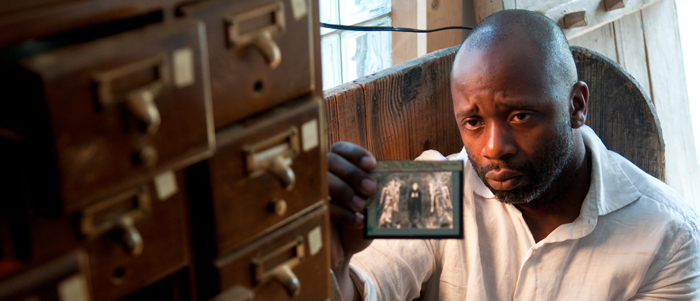It's as if he wants to get this part out of the way first: Theaster Gates knows that the South Side of Chicago has long been burdened with a bad reputation—and that the reputation is at least partially merited. "We know there's violence, and we know there's gang activity," Gates says. "We know there's not a strong economic core."
What Gates most wants to talk about, however, is the potential that gets lost in the discussions of the problems. "What we don't consider enough is the rich cultural legacy," Gates says, "the kind of cultural curiosity, the alternative histories. ... There is a deep intellectual reservoir that has never been fully tapped. And if it has, its voice has never been amplified loudly enough."
Gates, a University resident artist, visual-arts lecturer, and director of arts-program development, has dedicated himself to amplifying that voice.
His Dorchester Project is the most ambitious example of his goal to find run-down spaces in struggling black neighborhoods and transform them through art and culture. Although the South Side's Grand Crossing neighborhood serves as the locus of his movement, Gates's art has been the subject of exhibitions in other cities, including St. Louis and Seattle. He has purchased property in St. Louis with the idea of transforming blighted spaces there, as well.
Gates, a West Side native who has arts, religion, and urban planning degrees from Iowa State University, has accumulated an eclectic body of work from pottery to music—his Black Monks of Mississippi ensemble includes musician Leroy Bach, formerly of the alt-rock band Wilco. The ongoing project in Grand Crossing, however, promises to be his magnum opus.
The Dorchester Project's centerpiece is a once-abandoned two-story house at 6916 South Dorchester. To create what he hopes will become a South Side cultural hub, where artists and other visitors can congregate both informally and for planned events, Gates went on a bargain spending spree. He purchased the property for $16,000. Then he bought 8,000 vinyl albums from a Hyde Park record store, Dr. Wax, which was closing. He added to the mix approximately 14,000 used books and thousands of photographic slides that the University of Chicago was planning to discard. Every item serves a double purpose—arrayed throughout the home, each one becomes part of the overall decor while also providing cultural material for artists and other visitors, a conversation piece unto itself.
The house is the first of many spaces on the block that Gates, who has also purchased two vacated foreclosures nearby, plans to transform. For stigmatized neighborhoods, he says, art can be the springboard to renaissance. "There's dignity everywhere," Gates says. "It's easy to overlook because the people who write about culture in the city live north. The people who have the capacity to create new cultural opportunities usually create them in a place that seems economically viable, where you can bank on a certain kind of person going to a certain kind of thing."
For Gates, who joined the University in 2007, his job is an opportunity to bridge the gap between the campus arts culture and the surrounding neighborhoods. He intends to connect the two even more, developing a role with the University under the working title, "Director of Arts and Public Life."
"I'm having this conversation with my friends at the University of Chicago," says Gates. "How can our students become more cultured? How do we get our students more embedded in the cultural life of the city? How do we ensure that our students have a voice and are engaged in the community? ... How do we make sure the community has access to the cultural life of the University? ... Is there a way I can help contribute to that?"
With his Dorchester Project, Gates is leading the discussion.










